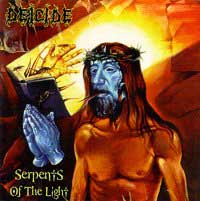Deicide - Serpents of the Light
Review: Extending their intense fusion of compelling rhythm and structurally hidden melody that inspired two generations of death and black metal, Deicide have infused modern black metal technique into resiliently self-violent death metal structuralist nihilism, bringing forth a monster of their characteristically hydraulic riffing and thunderously abrupt and seemingly random rhythmic changes that also speaks the fluid language of black metal melodic vectoring.
Riffs are now mostly composed of single notes played at vibrant tremolo speeds, incorporated into melody supporting the implied musical contortions of the main riff and the rhythm of its chorus, driving at various parts of each song the directions and harmonic tendencies of pieces to come. Drumming contains the music like a ribcage and propels it with a hydraulic bounceback beating of percussion that drives the music in a terrifying organic but abstract direction. Recombinations of the crucial connecting elements of each song lets them restate, in rephrase, the various convergences of ideas and their evolution. Music devolves from basic idea to sound crafted in deliberately bent and simplistic ways with a focus on a more facefront virus: the repeated mandate of a single-line chorus. This musical language has all of the uncertainty out of certainty that death metal carried, and all of the ambiguous fluctuation of tones that black metal has developed melodically.
While this makes for a very listenable work that is easier to follow than, say, their second album Legion, the need for polemic clarity of communication has delimited the stylistic range of the band and constrained their creation: the thrill of discovery is gone and in its place is a fair amount of repetition of known ideas. Previous songs from this band have been modified and recombined to deliver the catchy and evocative chorus lines on top of proven sequences, leaving out the self-evidence and inspirational nonlinearity of earlier material. For example, the title track "Serpents of the Light" uses a modified verse rhythm of "Trick of Betrayed" and third track "Blame it on god" features a four-part counterpoint to "Dead by Dawn"'s chant of a phrase in two rhythms, and later songs on the album showcase quotations from the first three albums. The repetition in music echoes the repetition in lyrics, both of their own message and of an analogue to Christian proselytizing.
Nevertheless these rhythms retain their charged power and are carried well into this format by the inventiveness of the two guitarists and drummer Asheim's relentless accuracy riding a rhythm into its derivations and restatement. Shock troop tempo changes, galloping interludes, song bridges that pummel through conflicting musical directions and unify in emulsified rhythm, and precision counterpoint song fragments that give voice to the convoluted structures are all pieces of the equation.
At its best this music is brilliant: engaging, rhythmic like the weight of a gun in the hand, melodic with an urgency and dissonance that encourages the listener to see an emptiness opening like hope, in its moments of convergence a focus of beauty and unfulfilled, yearning adventurousness. Riffs melt open in rippling melody. Guitar solos seem often more tongue in cheek versions of the rock-cliché bending atonal comedy masterpieces of earlier albums, with more attention paid to lucidity and rhythmic placement in each phrase for comprehensibility. The at-times heavily dogmatic lyrics underscore the forbearance of rhythm with simple meter to emphasize and counterpoint the dominant chorus rhythm, often a single phrase in early 80s speed metal style.
Theatrics and horror movie aspects of the band have been toned down and the music made even more ambient, reducing its hard stops and edged rhythms in favor of flowing tremolo patterns and metaphrase percussion. Caught between manipulation and response, Deicide react, while in the process of responding. This duality of art is shown in the contrast between the innovative and the dialectically illustrative; despite leaning toward the latter, Serpents of the Light pulls itself out by its teeth, delivering a rigorous work of compelling intensity wrought from simplistic assemblies of notes and arranged in precision detail in a network of rhythms.
